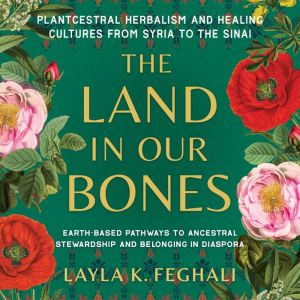

The Land in Our Bones
Plantcestral Herbalism and Healing Cultures from Syria to the Sinai--Earth-based pathways to ancestral stewardship and belonging in diaspora
Author: Layla K. Feghali
Narrator: Layla K. Feghali
Unabridged: 13 hr 23 min
Format: Digital Audiobook Download
Publisher: North Atlantic Books
Published: 02/13/2024
Categories: Nonfiction, Social Science, Cultural & Ethnic Studies, Middle Eastern Studies, Nature
Synopsis
Herbalist and author Layla K. Feghali shares a nuanced and layered cultural history of the healing plants of Southwest Asia and North Africa (the "Middle East") and Canaan (the Levant), exploring how they connect family and kin in diaspora—and call across generations of ancestral knowledge.
Tying cultural survival to land-based knowledge and the plants, herbs, geography, medicines, and foodways that shape and sustain us, Feghali re-maps Canaan and its crossroads, explores the complexities and yearnings of diaspora, and explains the wounds of colonization.
Feghali asks how we find our way home amid displacement: How do we embody the lands and the histories that bind us together, while holding the ways we’ve been wrested apart? What does it mean to be of a place, when extraction and empire destroy its geographies? How do we reconnect to interrupted ways of knowing—the seeing, being, connecting, and healing we feel in our bones? What do we rediscover when we look beyond what’s been lost and tend to what remains?
She shares lineages of folk healing in Canaan: those passed down by mothers and grandmothers; plants and practices used in prenatal and postpartum care; mystical traditions for spiritual healing; earth-based practices for emotional wellness; cultural foods and medicinal plants; and more.
Including recipes, family stories, and a glossary of meaningful terms, The Land in Our Bones asks us to reflect on belonging and lineage—to reclaim our cultural stories, to participate in them with reciprocity and care—and deepens our connection to the lands, people, and places we call home.

